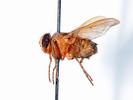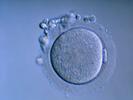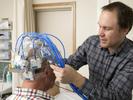Kara Manke appears in the following:
Gluten-Free Food Banks Bridge Celiac Disease And Hunger
Thursday, August 07, 2014
For people with celiac disease, eating gluten-free can be a struggle. But it's even harder for those who aren't always sure where their next meal will come from.
Two grass-roots organizations, Pierce's Pantry in Massachusetts and the National Gluten-Free Food Bank Movement in Denver, are working to help ...
Why Fat Grizzlies Don't Get Diabetes Like We Do
Tuesday, August 05, 2014
Sometimes nature comes up with elegant solutions to difficult problems, like how to gain weight and not get diabetes.
Take, for instance, the grizzly bear. How does this 750-pound mammal survive long, lean winters? Well, it just gets really fat beforehand and then sleeps the hungry season away.
Grizzly bears ...
Chef Grills Steak, Volcano-Style, With Molten Lava
Monday, August 04, 2014
How Cultures Move Across Continents
Friday, August 01, 2014
They may look like flight paths around North America and Europe. Or perhaps nighttime satellite photos, with cities lit up like starry constellations.
But look again.
These animations chart the movement of Western culture over the past 2,000 years, researchers report Friday in the journal Science.
To make these ...
How A Tiny Fly's Ears Could Help You Hear Better
Tuesday, July 22, 2014
Ormia ochracea is not a very likeable creature, even by fly standards.
This parasitic fly likes to leave its larvae on the backs of crickets. The larvae burrow inside the cricket and then proceed to eat the cricket alive.
But humans who have struggled with hearing loss might soon be ...
Head Scientist At CDC Weighs Costs Of Recent Lab Safety Breaches
Friday, July 18, 2014
To Make A Spacecraft That Folds And Unfolds, Try Origami
Thursday, July 17, 2014
Young Scientists Say They're Sexually Abused In The Field
Thursday, July 17, 2014
Many young scientists dream of their first trip to a remote research site — who wouldn't want to hang out with chimps like Jane Goodall, or sail to the Galapagos like Charles Darwin, exploring the world and advancing science?
But for many scientists, field research can endanger their health and ...
Why A Spoonful Of Medicine Can Be A Big Safety Risk For Kids
Monday, July 14, 2014
We've all done it. The bottle of Pepto-Bismol says to take two tablespoons, so you grab the nearest spoon from the silverware drawer and drink down two of those. It's probably pretty close, right?
Maybe not. With all the different sizes and shapes of spoons out there — soup spoons, ...
Why HIV Spreads Less Easily In Heterosexual Couples
Thursday, July 10, 2014
HIV is sexist.
A woman is twice as likely to catch the virus from an infected partner in a heterosexual relationship than a man is.
And homosexual men are at even greater risk. They're more than 20 times as likely to get infected from an HIV-positive partner than partners in ...
With Gene Disorders, The Mother's Age Matters, Not The Egg's
Monday, July 07, 2014
We women are all too aware that as we get older the risk of having a baby with genetic disorders goes up. All of a woman's eggs are primed up and ready to go before we are born. But the ones we ovulate later are more prone to genetic errors ...
Costlier Digital Mammograms May Not Be Better For Older Women
Wednesday, July 02, 2014
Medicare spending on breast cancer screening for women age 65 and older has jumped nearly 50 percent in recent years. But the rise in price was not associated with an improvement in the early detection of breast cancer.
Researchers at the Yale School of Medicine found that Medicare spending on ...
When Heat Stroke Strikes, Cool First, Transport Later
Friday, June 27, 2014
The first-ever World Cup water break (taken during the game between Portugal and the United States this week) is a reminder that we all need to take extra precautions when playing in the heat.
Sports-related heat injuries and deaths continue to rise nationally, according to estimates by the National ...
Sticky Streamers Of Staph Bacteria May Clog Up Medical Devices
Friday, June 27, 2014
Bacteria like to clump together and cling to surfaces, where they secrete bits of molecular debris that grow into a slimy protective coating.
These gooey collections of bacteria are called biofilms, and they can be found everywhere — on moist rocks in streams, inside water treatment plants, and even on ...
Few Doctors Warn Expectant Mothers About Environmental Hazards
Wednesday, June 25, 2014
Doctors regularly counsel expectant mothers about the risks associated with smoking, drinking and poor nutrition during pregnancy.
But many obstetricians are reluctant to speak with them about the potential dangers posed by toxic substances in the environment — things like heavy metals, solvents and pesticides.
That is the conclusion reached ...
To Defeat A Deadly Toxin, Disrupt Its Landing Gear
Thursday, June 19, 2014
Botulinum toxin may be the most poisonous substance on the planet. A mere speck of the stuff can kill a person.
But just what makes the toxin so potent?
Part of the answer lies in the molecules that carry the toxin through the body. These carriers, which are produced along ...
Microwave Helmet Could Diagnose Strokes As Patients Ride To Hospital
Monday, June 16, 2014
When a stroke hits, brain cells perish at an alarming rate. The faster a patient gets treatment, the less likely it is that he or she will suffer permanent damage.
But to pick the right treatment, doctors must find the underlying cause of the stroke fast.
Most strokes occur when ...















